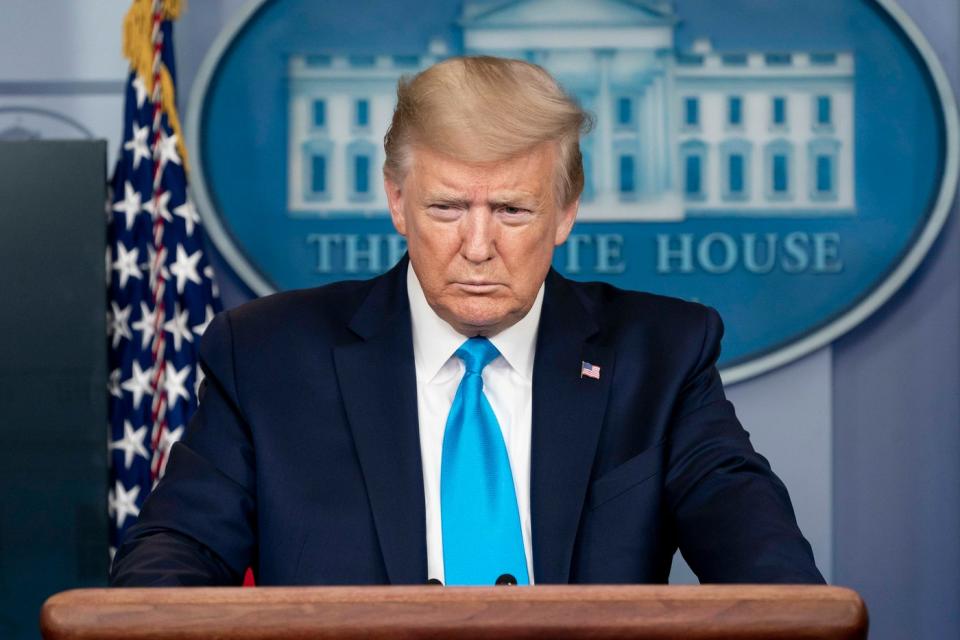Prediction: 3 Market-Leading Stocks That May Plunge if Donald Trump Wins in November
Exactly five weeks from today, on Nov. 5, voters from across the country will weigh in and decide which presidential nominee -- former President Donald Trump or current Vice President Kamala Harris -- will lead our nation forward over the next four years.
What happens on Capitol Hill doesn't always have relevance to Wall Street. But elections ultimately determine which president and political parties will shape fiscal policy over the next, at minimum, two years. Understanding the economic policy proposals of the two presidential candidates does have bearing for the investing community and corporate America.

For former President Donald Trump, his message has remained similar to what he echoed during his 2020 campaign. He's proposed a handful of new personal tax breaks, wants to further reduce the corporate tax rate to spur economic growth, is a big promoter of domestic energy production, and plans to get tougher with China.
While there are some pretty clear winners of this potential scenario, there are also time-tested and/or high-flying stocks that can end up as losers.
What follows are three market-leading stocks that can plunge if Donald Trump wins in November.
Nvidia
The first widely held stock that may be contending with some difficult headwinds if Trump wins in five weeks is Wall Street's leading artificial intelligence (AI) company Nvidia (NASDAQ: NVDA).
As most investors are probably aware, Nvidia's stock has enjoyed a historic ascent, with the company benefiting from a textbook expansion of its operations. In short order, Nvidia's AI-graphics processing units (GPUs) became the undisputed preferred choice for businesses running generative AI solutions and building/training large language models.
Though the prospect of lowering the corporate tax rate could, at least temporarily, juice Nvidia's gross margin and allow it to hang onto more of its income, another key aspect of Trump's economic plan has the potential to limit Nvidia's upside.
Specifically, Trump plans to take a hardline stance with China, the world's No. 2 economy by gross domestic product. He's proposed a 60% tariff on goods imported into the U.S. from China. Although Nvidia isn't importing products from China, the global No. 2 economy has consistently been a key generator of sales for Nvidia. The potential for Trump to spark a trade war may eliminate China's desire altogether to purchase chips from California-based Nvidia.
To add to the above, regulators under the Biden administration have, on two occasions, limited Nvidia's ability to export its high-powered AI-GPUs to China over the last two years. I'd deem it unlikely that Trump or his administration would ease or lift these restrictions, which are capping Nvidia's revenue potential in a key market.
I'd be remiss if I didn't also mention that every next-big-thing technology, trend, and innovation for 30 years has navigated its way through an early stage bubble. Investors consistently overestimate the adoption and utility of game-changing innovations, and AI seems unlikely to be the exception to this unwritten rule. If the AI bubble were to burst under a Trump presidency, arguably no company would feel the sting more than Nvidia.

Tesla
A second market leader that may be set to plummet if Donald Trump wins a second term is electric-vehicle (EV) manufacturer Tesla (NASDAQ: TSLA).
Tesla has used its first-mover advantages to build itself from the ground up to producing in the neighborhood of 2 million EVs annually on a run-rate basis. It became the first EV company to generate a recurring profit and is attempting to diversify its operations by expanding into energy storage.
Although former President Trump has hinted at giving Tesla CEO Elon Musk a position in his administration if reelected in November, he's also been critical of EV tax credits and tax incentives. While Trump hasn't concretely said he'd do away with the $7,500 EV tax credit for new purchases, his statements suggest this is a real possibility.
Tax credits play an important role in providing a potential price advantage for EVs, when compared to internal combustion-engine vehicles. If this credit is removed, arguably the most-enticing competitive edge for EVs goes away -- especially with EV charging infrastructure still somewhat limited.
To add to the above, Tesla's reliance on unsustainable sources of income -- specifically, interest income earned on its cash and automotive regulatory tax credits -- have rapidly increased as a percentage of pre-tax income. In the June-ended quarter, approximately 66% of Tesla's pre-tax income came from these two sources, with $890 million of its $1.89 billion pre-tax profit from regulatory credits.
It's also unclear how Trump's tariff policy will affect domestic and international sales of EVs for American-based companies. Tesla has been aggressively reducing the sales price of its EVs (Model's 3, S, X, and Y) since the start of 2023 to counter growing competition and rising inventory levels. Unfortunately, these price cuts haven't stopped inventory levels from rising on a year-over-year basis, and they've clobbered the company's operating margin.
Even if Musk were to land a role in the Trump administration, Tesla is a stock that would likely struggle with the former president back in the Oval Office.
Apple
The third magnificent stock that may be poised to plunge if Donald Trump wins in November is Wall Street's largest company by market cap, Apple (NASDAQ: AAPL).
Although Apple's stock has soared in 2024 on the heels of its AI ambitions and excitement surrounding the eventual incorporation of AI tools into its top-selling iPhone, it's the company's Services segment that's been the real highlight for years. CEO Tim Cook is overseeing a transformation that will see Apple become a platforms company. A subscription-driven model should lift its operating margin, smooth out the sales fluctuations that occur during iPhone upgrade cycles, and further enhance the company's impressive customer loyalty.
Similar to Nvidia, it might also benefit from a further reduction of the corporate tax rate. Apple has repurchased a market-leading $700.6 billion worth of its common stock since the start of 2013 and reduced its outstanding share count by 42.2% in the process. A lower corporate tax rate may encourage even more buybacks.
On the other hand, Apple imports some of its products from China, is reliant on a meaningful portion of its iPhone sales from China, and the overwhelming majority of its iPhones (along with Macs and iPads) are assembled in China. Between tariffs and the potential anti-American sentiment caused by a trade war with China, Apple could see its already stalling growth engine come to a complete halt.
Though buybacks have played a key role in lifting Apple's earnings per share over the last 11 years, what ails Apple's growth engine can't be fixed with the market's leading share repurchase program. Even a reduction in corporate tax rates won't be enough offset the persistent sales weakness Apple has been contending with across all of its physical product lines.
While tech stocks and all three major stock indexes thrived under Trump's first term in office, it's my prediction that Apple will flounder if Trump wins in November.
Should you invest $1,000 in Nvidia right now?
Before you buy stock in Nvidia, consider this:
The Motley Fool Stock Advisor analyst team just identified what they believe are the 10 best stocks for investors to buy now… and Nvidia wasn’t one of them. The 10 stocks that made the cut could produce monster returns in the coming years.
Consider when Nvidia made this list on April 15, 2005... if you invested $1,000 at the time of our recommendation, you’d have $743,952!*
Stock Advisor provides investors with an easy-to-follow blueprint for success, including guidance on building a portfolio, regular updates from analysts, and two new stock picks each month. The Stock Advisor service has more than quadrupled the return of S&P 500 since 2002*.
*Stock Advisor returns as of September 30, 2024
Sean Williams has no position in any of the stocks mentioned. The Motley Fool has positions in and recommends Apple, Nvidia, and Tesla. The Motley Fool has a disclosure policy.
Prediction: 3 Market-Leading Stocks That May Plunge if Donald Trump Wins in November was originally published by The Motley Fool
